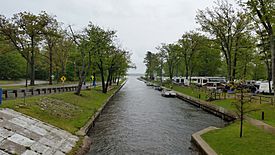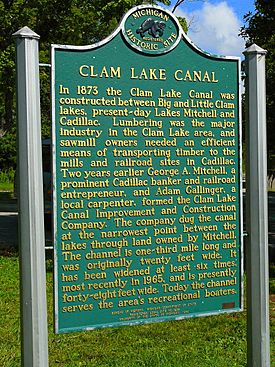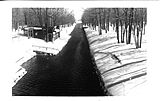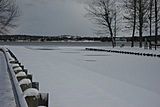Clam Lake Canal facts for kids
Quick facts for kids Clam Lake Canal |
|
|---|---|

Clam Lake Canal from M-115 (May 2017)
|
|
| Location | Mitchell State Park Cadillac, Michigan |
| Country | |
| Coordinates | 44°14′21.8″N 85°27′12.6″W / 44.239389°N 85.453500°W |
| Specifications | |
| Length | 0.33 miles (0.53 km) |
| Maximum height above sea level | 1,289 ft (393 m) |
| Status | Open |
| Maximum width | 48 feet (14.6 m) |
| History | |
| Former names | Black Creek |
| Modern name | Cadillac Canal |
| Current owner | Michigan DNR |
| Original owner | George A. Mitchell |
| Principal engineer | Clam Lake Improvement and Construction Company |
| Date completed | 1873 |
| Geography | |
| Connects to | Lake Cadillac and Lake Mitchell (originally known as Big Clam Lake and Little Clam Lake) |
| Depth | 2.25 feet (0.69 m) |
| Clam Lake Canal | |
|---|---|

Clam Lake Canal historic marker
|
|
| Designated | March 16, 1989 |
The Clam Lake Canal is a man-made waterway in Cadillac, Michigan. It is about .33 miles (0.53 km) long. This canal connects two lakes: Lake Mitchell and Lake Cadillac.
A man named George A. Mitchell built the canal in the 1870s. He was the founder of Cadillac, which was first called the Village of Clam Lake. Mitchell was a businessman who dealt with lumber and railroads. He needed a way to move logs to sawmills to build his new village. The canal helped transport these logs easily.
The canal has a strange secret. In early winter, it freezes over while the lakes next to it are still unfrozen. But then, when the lakes freeze solid, the canal thaws out and flows freely all winter!
Why Was the Clam Lake Canal Built?
In 1873, George A. Mitchell bought a piece of land. This land was about 40 acres (16 ha) big. It was located between what were then called Little Clam Lake and Big Clam Lake. Today, these are known as Lake Cadillac and Lake Mitchell.
A small stream called Black Creek already connected the lakes. Mitchell saw that he could make this stream much wider. This would create a great way to move logs for his lumber business.
Mitchell first convinced the Grand Rapids and Indiana Railroad to change their train route. He wanted the tracks to go to the eastern end of Little Clam Lake. Then, he started a company called the Clam Lake Improvement and Construction Company. This company helped him widen the stream into the canal we see today.
The Clam Lake Canal Mystery Explained
The Clam Lake Canal has a very unusual event almost every winter. It's so strange that it has even been featured in Ripley's Believe-It-Or-Not books! This mystery is about how the canal freezes and thaws.
In early winter, when temperatures are cold, the canal freezes first. At this time, Lake Mitchell and Lake Cadillac are usually still unfrozen. But then, as winter gets colder, the two big lakes freeze over with thick ice. That's when the canal does something surprising: it thaws out and flows with unfrozen water!
The Department of Natural Resources has an explanation for this. It has to do with how water behaves. Water is heaviest and most dense at 39 degrees Fahrenheit (about 4 degrees Celsius). It becomes lighter both above and below this temperature.
In early winter, the lighter, colder water floats to the top of the canal. Since the canal is shallow and has less water than the lakes, it freezes quickly. This is why the canal freezes before the larger lakes.
As winter continues and temperatures drop even more, the lakes start to freeze. When the lakes freeze, the warmer water underneath the ice is pushed out. This warmer water flows into the canal, causing it to thaw and flow freely.
What is the Clam Lake Canal Used For Today?
The Clam Lake Canal is sometimes called the Cadillac Canal. Over the years, it has been made wider six times. It is now about 50 ft or 15 m wide.
Today, people use the canal for fun activities. It's a popular passage for local boaters to travel between Lake Mitchell and Lake Cadillac.
In 1919, the area around the canal became Mitchell State Park. The canal itself was recognized as a special historic site on March 16, 1989. This means it's an important part of Michigan's history.
 | Calvin Brent |
 | Walter T. Bailey |
 | Martha Cassell Thompson |
 | Alberta Jeannette Cassell |






